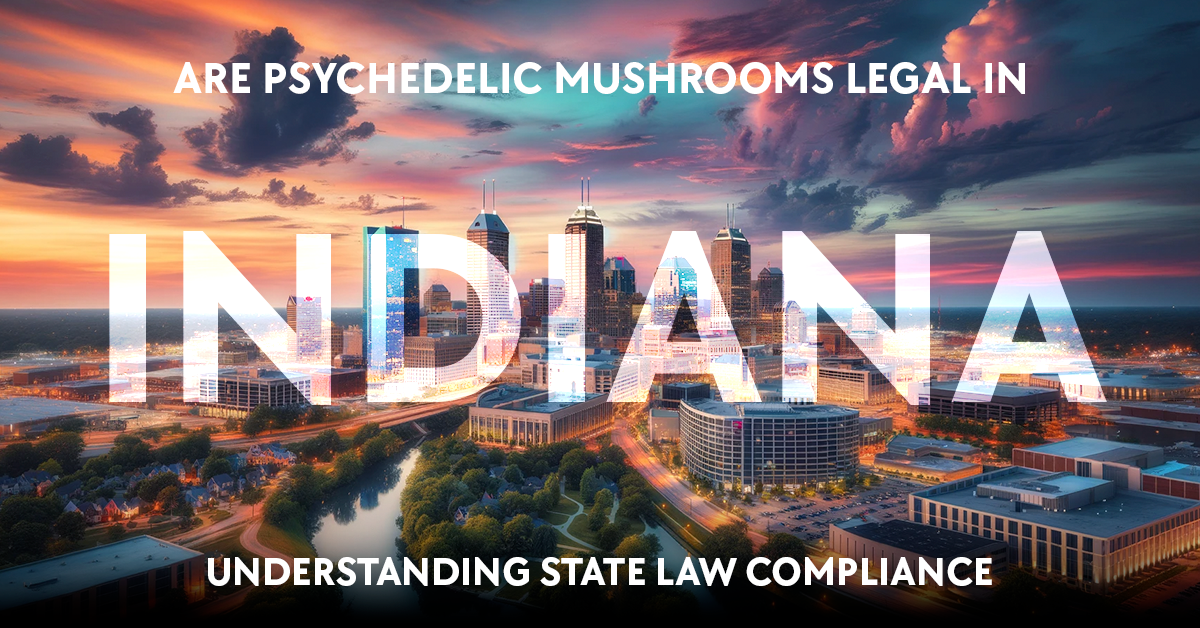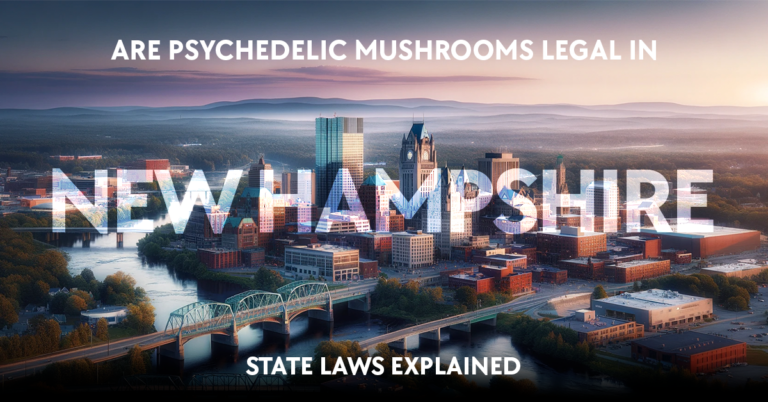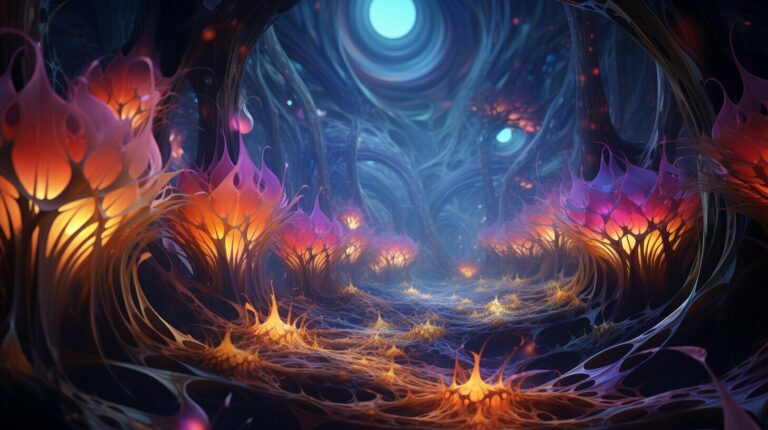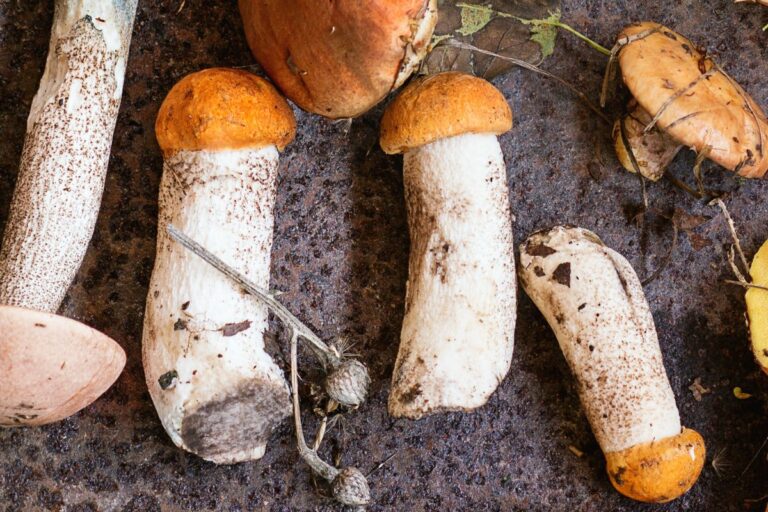When exploring the legal status of psilocybin or psychedelic mushrooms in Indiana, you may find various nuances. Psychedelic mushrooms, containing the active ingredient psilocybin, are listed as Schedule I substances under federal law due to their potential for abuse and lack of accepted medical use. As such, they are generally illegal to possess, distribute, or cultivate.
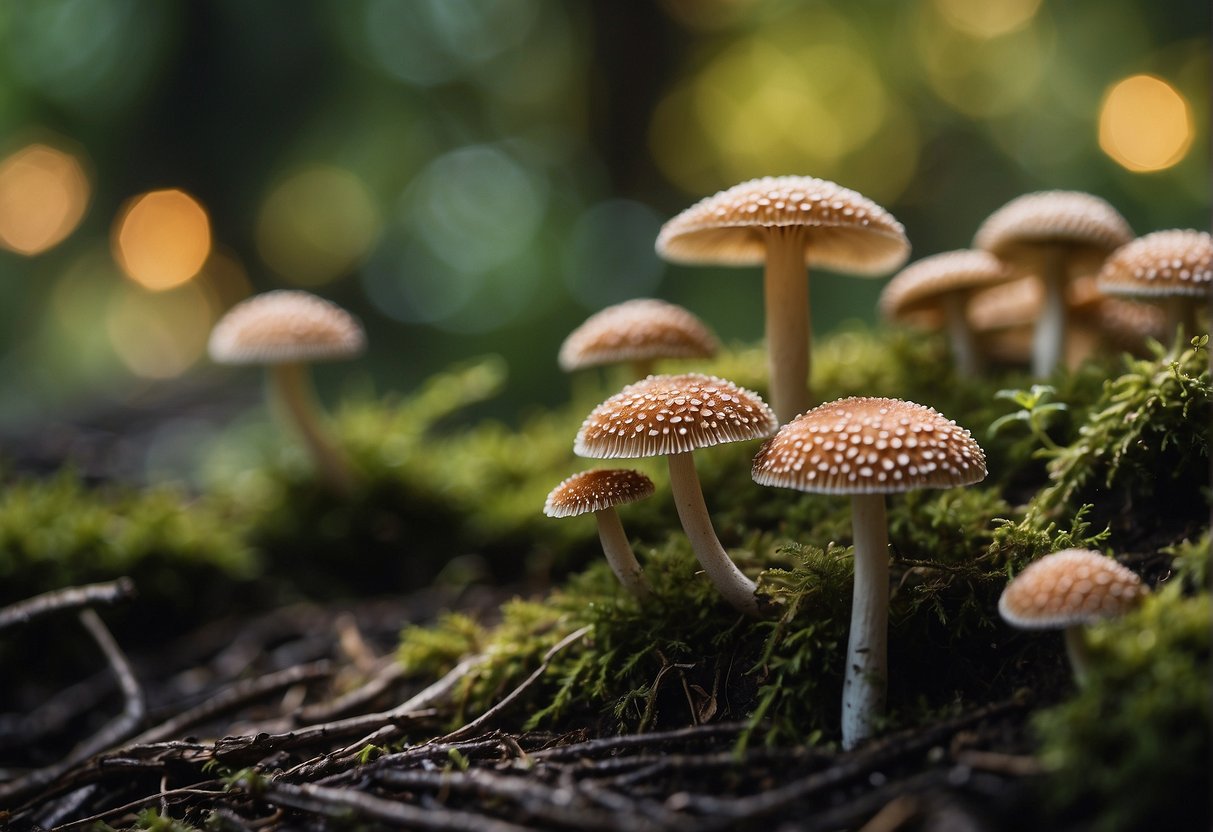
However, in Indiana, as in many other states, the law isn’t always clear-cut regarding the spores of these mushrooms. While the spores themselves may not contain psilocybin and thus could be considered legal, the act of cultivating them to produce mushrooms containing psilocybin is illegal. It’s important to note that laws continuously evolve, and legal actions in Indiana have specifically addressed the legality of psilocybin mushrooms, affirming their status as hallucinogenic and therefore prohibited drugs.
Given the complexity of drug laws and the specifics pertaining to hallucinogenic drugs, those found to be engaging with psychedelic mushrooms in Indiana could face significant legal consequences. Even with discussions and shifts in perception about the medicinal value of psilocybin in scientific communities, it remains a controlled substance, and its legal position in Indiana upholds that classification.
Legality of Psychedelic Mushrooms in Indiana
Table of Contents
https://www.youtube.com/watch?v=sq921wHJF30&embed=true
In Indiana, psychedelic mushrooms are classified as a Schedule I controlled substance. This classification is indicative of substances that have a high potential for abuse and no accepted medical use, placing these mushrooms in the same legal category as other narcotics considered dangerous to public health.
Possession of psychedelic mushrooms is illegal in Indiana. If you are found with these mushrooms, you may face criminal penalties. According to Indiana Code IC 35-48-2-4, being caught with even a small amount of psychedelic mushrooms can result in a charge of a felony offense.
The consequences of possessing psychedelic mushrooms can vary, but they are typically severe; they include hefty fines and potential jail time. The severity of the punishment often correlates with the amount possessed and whether there’s intent to distribute.
| Quantity | Charge | Potential Penalty |
|---|---|---|
| Small (personal use) | Felony | Fines and jail time |
| Larger amounts | Felony with intent to distribute | Longer jail sentence and larger fines |
As of now, there has been no move to decriminalize psychedelic mushrooms in Indiana, meaning that any amount you possess could lead to criminal charges. It’s important to understand that this law is actively enforced, and the state has not shown leniency towards the use or possession of these substances.
Psychedelic mushrooms have not been recognized for medicinal purposes in the state, and their use can be considered a serious criminal offense. Engaging with these substances can have significant legal repercussions for your future.
Remember, while broader discussions on drug policy reform continue across the United States, Indiana’s laws currently prohibit the possession and use of psychedelic mushrooms, and it’s essential to abide by these laws to avoid criminal penalties.
Psilocybin vs Other Controlled Substances

In Indiana, as with many U.S. states, psilocybin—the psychoactive compound found in certain mushrooms—is classified alongside a range of other controlled substances, each with its distinct legal status and implications. It’s critical for you to understand the nuances of these classifications and how psilocybin stands in comparison to other compounds, including psychedelics, opiates, and prescription medications.
Classification of Psilocybin and Related Compounds
Psilocybin is classified as a Schedule I drug under the Controlled Substances Act, which indicates a high potential for abuse, a lack of accepted medical use, and the absence of accepted safety for use under medical supervision. Psychedelics like LSD, DMT, and mescaline also fall under this category. These substances, including their various isomers, are seen as having no medical benefit under the law, which significantly impacts their legality and potential for research.
Comparative Analysis with Other Psychedelics
In terms of legal standing, psilocybin is closely aligned with compounds such as LSD (lysergic acid diethylamide) and DMT (N,N-Dimethyltryptamine), both of which are also considered Schedule I substances. However, distinctions arise when comparing their pharmacological effects and potential therapeutic applications. For instance, research into MDMA (commonly known as ecstasy), another Schedule I substance, has shown promise in treating PTSD, potentially challenging its current classification.
Differentiation from Opiates and Prescription Medications
Contrasting with psychedelics, opiates such as morphine and oxycodone are often classified under Schedules II or III due to their accepted medical uses despite their high potential for abuse. The legal manufacture and prescription of these drugs are tightly regulated to prevent misuse. Substances like ketamine, an anesthetic with psychedelic properties, are listed in Schedule III, which recognizes their moderate to low potential for physical and psychological dependence relative to the substances in Schedules I and II.
Laws Governing Mushroom Spores
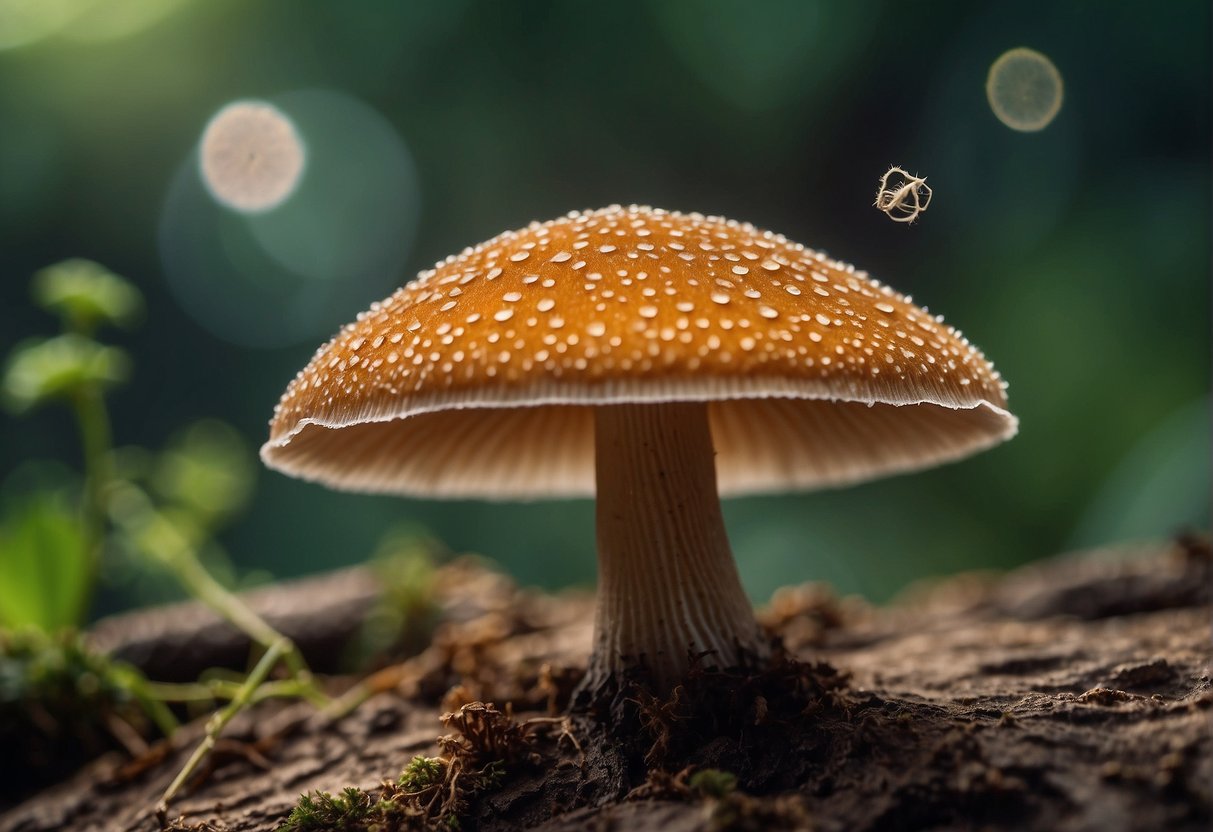
When considering the purchase or possession of mushroom spores in Indiana, it’s important to distinguish between the spores themselves and the act of cultivation. Spores technically do not contain psilocybin, the psychoactive compound found in psychedelic mushrooms, which leads to a notable legal distinction. In Indiana, psychedelics remain illegal; however, mushroom spores, which do not contain the scheduled substances, fall into a gray legal area.
Before you consider engaging with vendors or attempting to grow mushrooms, you should know that while it is not illegal to purchase or possess mushroom spores for educational and research purposes, cultivation of these spores into mature, psychedelic mushrooms is prohibited by state and federal law due to the presence of psilocybin.
There has been a movement towards decriminalization of psychoactive substances across the country, but as of the last update to this article, Indiana has not moved to legalize psychedelics or their cultivation. The possession of fully grown psychedelic mushrooms carries potential legal repercussions, whereas possessing the spores does not, provided there is no intent to cultivate.
Here is what you need to remember:
- Purchasing spores: Legal for microscopy and research.
- Cultivating mushrooms: Illegal, leading to criminal charges.
- Decriminalization: No bills passed in Indiana as of now.
Always verify the current status of local laws, as legal landscapes are subject to change. If you’re considering exploring this area, thorough legal counsel is recommended to navigate these complex regulations.
Regional Perspectives on Psilocybin
As regional perspectives on psychedelics shift, it’s important to stay informed about the legal status and societal views of psilocybin, particularly in light of recent legislation and policy changes regarding these substances.
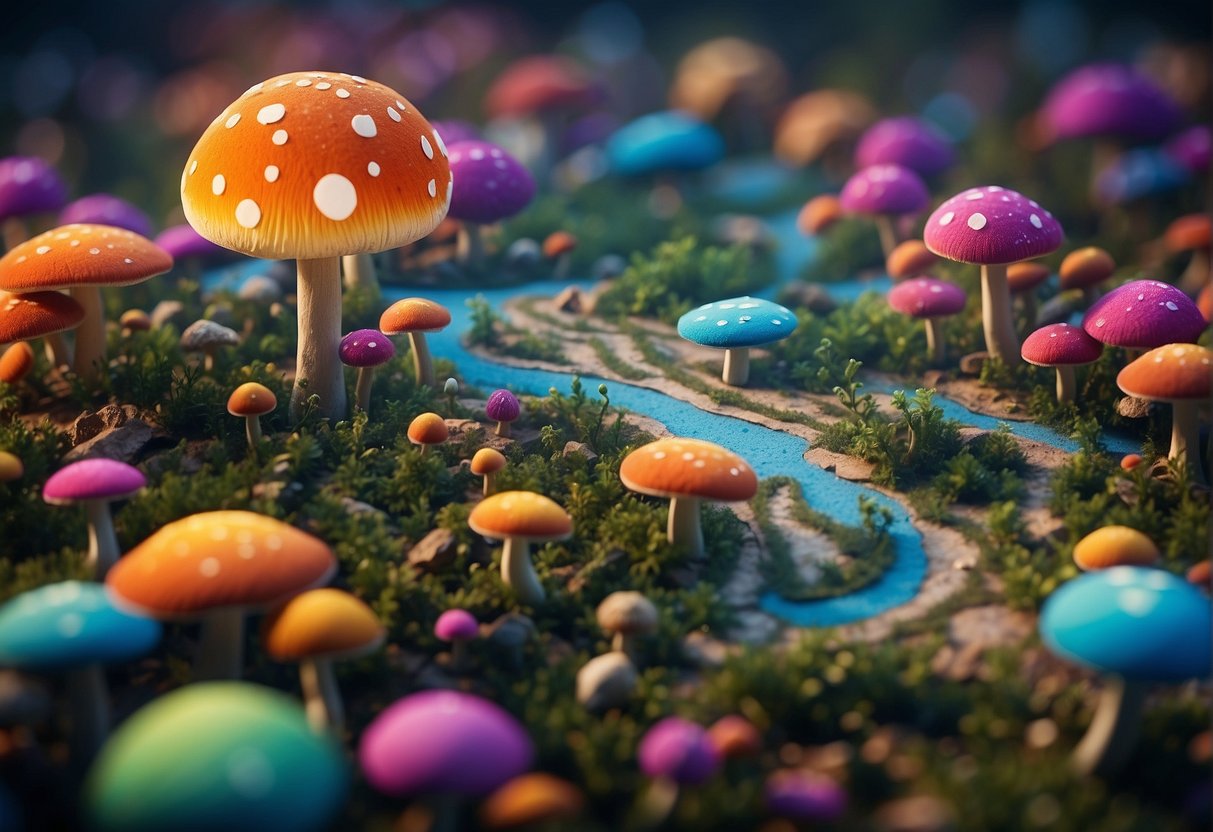
Decriminalization Efforts in Other States
In the United States, you will find varying degrees of legal status for psilocybin mushrooms. Oregon has taken a pioneering role, passing a ballot measure to decriminalize psilocybin and create a framework for its therapeutic use. Moving eastward, in Colorado and Michigan, certain cities have passed resolutions that decriminalize the use and possession of psilocybin mushrooms. Authorities in these areas typically prioritize other law enforcement matters over prosecuting psychedelic users. Though not statewide, these local efforts reflect a growing trend across the country.
International Views on Psychedelic Mushrooms
The conversation around psychedelic mushrooms isn’t confined to the United States. In Canada, psilocybin therapy is accessible under certain conditions, showing that decriminalization and research are ongoing. This contrasts with countries like Georgia and Idaho, where psilocybin remains strictly illegal with severe penalties. Understanding these nuanced positions sets the stage for a broader conversation on where public sentiment and legal frameworks stand on a global scale, reflecting a diverse range of attitudes toward the legalization and decriminalization of psilocybin.
Penalties for Psychedelic Mushroom Possession
In Indiana, the possession of psychedelic mushrooms is subject to strict criminal penalties. If you are caught with these substances, it is considered a criminal offense. The law does not differentiate between the possession of mushrooms for personal use or for distribution; therefore, it’s crucial to understand the risks associated with having these controlled substances.
Should the police find you in possession, the severity of penalties depends on the quantity and your intent. Small amounts may be deemed personal use, often resulting in lighter punishments, while larger amounts can imply intent to distribute, leading to more severe consequences.
Jail time is a realistic possibility for a possession charge. For a first-time offense involving a small number, you might face a fine and potentially short-term imprisonment. However, repeated offenses or possession of large amounts could escalate the charge to a felony, entailing a significant period of incarceration.
Criminal penalties also include fines which can be quite hefty, causing long-term financial strain. It’s crucial to note that a conviction could lead to a criminal record, affecting your future employment and living circumstances.
Remember that laws are subject to change, and recent discussions about psychedelics and their legal status might lead to legislative updates. Always stay informed about the latest legal developments to avoid unintended legal complications.
Emerging Trends in Psychedelic Use and Legalization
Psychedelic substances, notably psilocybin mushrooms, have gained increased attention for their potential to treat mental illnesses such as treatment-resistant depression, PTSD, and existential anxiety. The shifting perspective on these substances is driving a change in legal policies across the United States, although this landscape varies by state.
Historically classified as Schedule I drugs, psychedelics were tightly restricted due to concerns over addiction and hallucinogenic effects. However, emerging research is painting a different picture, highlighting their medicinal use potential. Consequently, several cities and states are re-evaluating their stance on these substances.
Decriminalization and Legal Efforts:
- Decriminalize: Cities like Denver and Oakland have decriminalized the possession of small amounts of psychedelic mushrooms.
- Legalize: Oregon has legalized psilocybin for therapeutic use under supervised settings.
- Medicinal Research: Progressive policies in certain jurisdictions allow for medicinal research into substances like psilocybin and 5-MeO-DMT.
Public Health Considerations:
- Regulatory Changes: If further legalized, psychedelics could shift from a law enforcement issue to a public health one.
- Safety and Efficacy: Clinical trials are ongoing to ensure safety and efficacy for treating various mental health conditions.
As you explore these trends, it’s important to note that in Indiana, psychedelic mushrooms remain illegal. Yet, with national discussions around psychedelic drugs on the rise, one can observe a growing dialogue focused on therapeutic benefits versus traditional prohibition, indicating a possible future of evolving legislation in this area.
Psychedelics for Therapeutic Purposes
As you explore the potential of psychedelics for medicinal purposes, understand that while their use remains controversial, emerging research suggests benefits in treating certain mental health conditions.
Research and Evidence on Medical Benefits
Johns Hopkins University has been at the forefront of researching psychedelics for medical use. Studies indicate psychedelics, such as psilocybin, show promise for treatment-resistant depression and existential anxiety commonly associated with life-threatening diseases. Another compound, 5-MeO-DMT, found in plants and certain animals, is being studied for its intense psychoactive properties and impact on mental illness.
Legal Status of Psychedelics for Medicinal Use
Currently, Indiana does not permit the medicinal use of most psychedelics. However, scientific inquiry into these substances is legal, and compounds like ketamine have been approved for medical treatment of conditions like PTSD. The legal status of plant-based psychedelics like salvia divinorum varies, and they remain illegal under federal law for medicinal use despite research into their therapeutic potential.
Impact on Mental Health and Addiction Treatment
Clinicians and researchers are investigating psychedelics for their potential to revolutionize mental health and addiction treatment. Psychedelic drugs are believed to offer significant benefits in treating addiction by potentially altering neural pathways or offering profound personal insights during controlled therapeutic sessions. These treatments could offer hope for those struggling with severe forms of mental illness who have not responded to traditional therapies.
Educational Context and Public Safety
When considering the legality of psychedelic mushrooms in your area, it’s essential to understand that public safety and educational settings are highly prioritized. In Indiana, as with many states, the possession and sale of psychedelics, like psilocybin mushrooms, is generally illegal due to their classification as Schedule I controlled substances under federal law.
Public Health Implications:
- Addiction potential: While studies have shown a lower potential for addiction with psychedelics compared to other substances, the risk of misuse still exists.
- Mental health risks: Potentially exacerbated psychiatric conditions could pose a public health concern, particularly among vulnerable populations.
- Potential therapeutic uses: Emerging research indicates potential benefits in controlled clinical settings, which points towards future educational opportunities.
In a School Environment:
- Prevention education: Schools often integrate drug education into their curricula to inform you about the legal and health repercussions of drug use, including psychedelics.
- Counseling services: Institutions may provide resources to support students dealing with substance misuse issues.
Your Safety:
- Legal repercussions: Possession or use can lead to legal consequences, affecting various aspects of your life, such as employment opportunities and educational prospects.
- Physical and psychological effects: Psychedelics can induce intense experiences; unmonitored use can lead to adverse events, highlighting the importance of public safety protocols.
Your awareness of the landscape—where public health, legal framework, and hallucinogenic drugs intersect—will help you navigate this complex field responsibly.
Risk Factors and Safety Considerations
When considering the use of psychedelic mushrooms, it is crucial to be aware of the risk factors and safety considerations associated with these substances. Psychedelic mushrooms, often referred to as ‘magic mushrooms’, contain psilocybin, a substance classified as a hallucinogenic drug that can significantly alter perception and mood.
Mental Illness: If you have a personal or family history of mental illness, particularly psychotic disorders such as schizophrenia, using hallucinogenic drugs may exacerbate symptoms or precipitate the onset of these conditions. It’s recommended to undergo a thorough mental health screening before any use.
Addiction Potential: While research suggests that psychedelic mushrooms are not addictive in the same way substances like opioids or stimulants can be, they can still lead to patterns of misuse. It’s essential to recognize that psychological dependence is possible.
Public Health: The use of unregulated substances poses a public health concern due to the variability in potency and the risk of contamination. Individuals under the influence may also exhibit behaviors that can lead to harm to themselves or others.
Safety Measures: If you choose to use psychedelic mushrooms, consider the following safety measures to reduce risks:
- Ensure a safe environment: This limits external stimuli that may lead to a negative experience or injury.
- Have a sober ‘trip-sitter’: A responsible individual who can assist if the experience becomes overwhelming.
- Be informed: Knowing the legal status, Psilocybin Mushroom Legal Defenses in your area and understanding the potential legal consequences is important. As of the latest information, psychedelic mushrooms remain illegal in Indiana.
By staying informed and cautious, you can minimize the risks associated with hallucinogenic drugs. Always prioritize your mental and physical well-being when considering any substance use.
Cultural and Historical Significance of Psychedelics
Throughout history, psychedelics such as psilocybin mushrooms, ayahuasca, and salvia have played a significant role in various cultures around the world. These substances, often derived from natural sources, have been used for centuries in religious ceremonies, spiritual practices, and rituals.
-
Psilocybin Mushrooms: Often called ‘magic mushrooms’, these fungi were used by indigenous peoples of Mesoamerica for spiritual and divinatory purposes. They are depicted in pre-Columbian art and were considered sacred for their mind-altering effects.
-
Ayahuasca: Originating from the Amazon rainforest, ayahuasca is a powerful brew used traditionally by indigenous tribes for spiritual healing and as part of shamanic rituals.
-
Salvia: Known as Salvia divinorum, this plant has been used in religious ceremonies by the Mazatec people in Mexico, primarily for its visionary effects during spiritual healing sessions.
These substances have cultural significance, often symbolizing the connection between humans and the spiritual world. They have been used as tools for exploration of the psyche, as medicines for psychological or physical healing, and have held a place in traditional medicine.
In modern times, there is a growing body of historical and scientific research into the therapeutic potential of these substances. This research aims to understand their role in mental health treatments and how they can contribute to knowledge within medicine and psychology.
Your understanding of these psychedelics should acknowledge the depth of their historical roots and the importance they hold in various cultural contexts. It’s essential to recognize that the use of these substances is not just a recent phenomenon but has been part of human experience for thousands of years.
Frequently Asked Questions
If you’re seeking information on the legality of psychedelic mushrooms in Indiana, this section will clarify current laws, potential legal ramifications, and the state’s stance on psychedelics.
What is the current legal status of psilocybin mushrooms in Indiana?
In Indiana, psilocybin mushrooms are classified as a Schedule I controlled substance. This means they’re illegal to possess, use, sell, or cultivate.
Can individuals possess or use psilocybin mushrooms for medical purposes in Indiana?
Currently, Indiana law does not permit the possession or use of psilocybin mushrooms for any medical purposes.
Are there any ongoing legislative efforts to change the legality of psychedelic mushrooms in Indiana?
As of my knowledge cutoff in early 2023, there were no publicized efforts to change the legality of psychedelic mushrooms in Indiana.
What are the penalties for possession or distribution of psychedelic mushrooms in Indiana?
The penalties for possession or distribution of psychedelic mushrooms in Indiana can be severe, including stiff fines and potential imprisonment.
Does Indiana law differentiate between naturally occurring psychoactive substances and synthetic ones?
Indiana law does not typically differentiate between naturally occurring psychoactive substances, like psilocybin mushrooms, and synthetic ones; both are regulated under controlled substances law.
What should a person expect if caught with psychedelic mushrooms by law enforcement in Indiana?
If caught with psychedelic mushrooms by law enforcement in Indiana, you should expect to face criminal charges that align with the possession of a Schedule I controlled substance.

